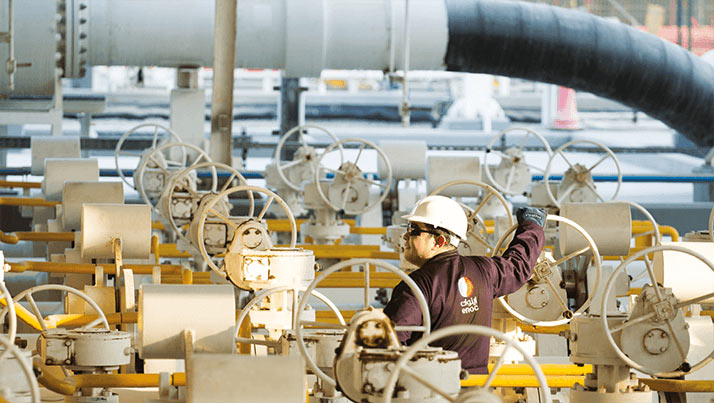Annual Review 2017
enoc.comThe oil industry has endured several years of weak demand and low prices. However, during 2017 the average crude oil price rose from US $45 to US $55 per barrel, after the market turned to deficit following OPEC and non-OPEC cooperation to reduce production. Meanwhile, oil demand growth was healthier thanks to an improvement in the global economy and low oil retail prices, which helped boost consumption.
ENOC’s continuous focus on customer service and supply chain strengths, coupled with sustained domestic demand, has translated into a modest increase in fuel product sales volume during the year. Revenues reached US $16,415 million, up 24 percent from 2016. Most of our segments managed to maintain performance and preserve profitability after adjusting for non-recurring gains.
The average gross field production from our Exploration and Production (E&P) segment for 2017 was 83,952 bopd (2016: 90,301 bopd). Production decreased by about 7 percent, due to challenges in the field. During the year, the E&P segment entered into a marketing arrangement for a significant proportion of its entitlement export production to be marketed through Baku, Azerbaijan, and Makhachkala, Russia. The segment’s contribution to Group profit was lower than the previous year – primarily due to a one-off share of abandonment and decommissioning funds presented under ‘other income’ in 2016.
Trading reported strong volume and margin growth in a challenging and overcrowded oil market with relatively low volatility, few arbitrage opportunities, and thinning margins. A weak MTBE market impacted the profitability of the MTBE plant. The refinery achieved one of its highest-ever throughputs due to plant utilisation of more than 100 percent, while progressing our largest-ever facility expansion project.
In the Group’s storage business, capacity utilisation remained under pressure in Singapore and Fujairah, due to increased competition, weak contango, and general economic slowdown.
Higher volumes were achieved by ENOC’s gas marketing and aviation businesses. Margin management and costs were constantly monitored during the year and the segment was able to retain and grow our customer base through efficient client management. Our focus remained on volume growth – both in local and international markets – and effective credit management.
The retail business witnessed another year of increased fuel volumes. Providing a high-quality customer experience is fundamental to the ENOC culture, and our differentiated customer value proposition resulted in strong brand recognition.
Cash flow, financing, and capital expenditure
Liquidity management across major lines of business has remained robust. Cash generation during the year enabled the Group to undertake various capital expenditure projects and the payment of dividends to our shareholder. The Group commands strong debt servicing capacity, while the optimisation between short and long-term debt has continued. The average cost of debt also remains very competitive.
Major capital expenditure undertaken includes completion of 17 wells in the Dzheitune (Lam) and Dzhygalybeg (Zhdanov) fields by our upstream segment, completion of the crude oil tank-farm terminal and Lam E platform, and upgrade of berths to increase the loading capacity at Aladja Jetty.
In response to the UAE’s drive towards clean energy, ENOC Group embarked on its Jebel Ali refinery expansion project. Expected to be completed by 2019, the project involves adding a new condensate processing train to the existing facility, expanding daily capacity from 140,000 barrels to 210,000. This will ensure that the revamped refinery’s production, which will include gasoline, jet fuel and diesel, not only meets the stringent Euro 5 standards in the local and international markets, but also meets expanding domestic demand while maintaining flexibility to tap into international market opportunities.
On December 31, 2017, the Group’s cash and bank balances were sufficient to meet its current and future requirements and contractual obligations.
Outlook
Middle East economies, particularly those in the GCC region, are transitioning towards a ‘new normal’, and 2018 will mark some interesting milestones.
Households and firms will need to adapt to the implementation of value-added tax (VAT) as part of a more widespread trend towards increasing government revenues from sources other than fuels. On the other hand, the rally in oil prices is supporting economic recovery among oil-exporting countries. As higher oil prices improve confidence and financial conditions, the UAE economy should grow. The non-oil sector will also benefit from capital spending on the Dubai 2020 World Expo.

